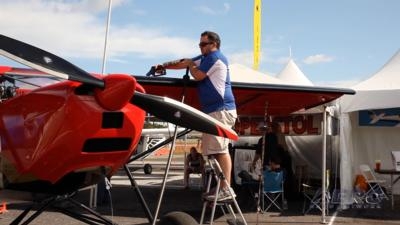Mon, Apr 22, 2024
Inquiry Was Sparked By the University of North Dakota (UND) Aviation Program's Experience
In a significant development impacting piston-engine aircraft operations, Lycoming Engines has released an update on its investigation into valve seat recession observed in engines using UL94 fuel.

The inquiry was sparked by the University of North Dakota (UND) Aviation program's experience after switching its fleet to UL94, a 94-octane unleaded fuel, in June 2023. Despite initial positive outcomes, UND detected abnormal valve seat recession after logging 46,000 flight hours with the new fuel, prompting a return to the traditional 100LL avgas in October.
Lycoming's root cause analysis revealed that while the engine and airframe components meet specifications and are unlikely contributors to the issue, the characteristics of UL94 under certain operational conditions could indeed influence valve seat durability. Key findings suggest that the aromatic concentration in UL94, although not currently regulated by ASTM D7547--the standard specification for hydrocarbon unleaded aviation gasoline--may affect engine valve seats. Higher aromatic levels can alter flame speed and increase particulate abrasiveness, subsequently accelerating valve seat wear.
Responding to these findings, Lycoming is collaborating closely with the FAA to examine how different piston engines respond to variations in fuel aromatics. This partnership aims to refine fuel standards and provide clearer guidelines for aircraft operators on managing fuel use, particularly how leaning techniques could mitigate potential issues associated with high aromatic concentrations.

This investigation is part of Lycoming's commitment under the FAA's Eliminate Aviation Gasoline Lead Emissions (EAGLE) initiative. The project seeks to replace leaded avgas with a high-octane unleaded alternative by 2030, ensuring a safer and more environmentally friendly future for aviation. Through continued research and industry collaboration, Lycoming aims to enhance fuel formulations to prevent mechanical issues and support the aviation sector's transition to unleaded fuels.
More News
Aero Linx: Model Aeronautical Association of Australia MAAA clubs are about fun flying, camaraderie and community. For over 75 years, the MAAA has been Australia’s largest fl>[...]
Touchdown Zone Lighting Two rows of transverse light bars located symmetrically about the runway centerline normally at 100 foot intervals. The basic system extends 3,000 feet alon>[...]
“Discovery and innovation are central to our mission at Virgin Galactic. We’re excited to build on our successful record of facilitating scientific experiments in subor>[...]
How To Get A Story On Aero-TV News/Feature Programming How do I submit a story idea or lead to Aero-TV? If you would like to submit a story idea or lead, please contact Jim Campbel>[...]
Student Pilot Reported That During Rotation, “All Of A Sudden The Back Of The Plane Kicked To The Right..." Analysis: The student pilot reported that during rotation, “>[...]
 ANN's Daily Aero-Linx (05.02.24)
ANN's Daily Aero-Linx (05.02.24) ANN's Daily Aero-Term (05.02.24): Touchdown Zone Lighting
ANN's Daily Aero-Term (05.02.24): Touchdown Zone Lighting Aero-News: Quote of the Day (05.02.24)
Aero-News: Quote of the Day (05.02.24) ANN FAQ: Contributing To Aero-TV
ANN FAQ: Contributing To Aero-TV NTSB Final Report: Cirrus Design Corp SR20
NTSB Final Report: Cirrus Design Corp SR20




